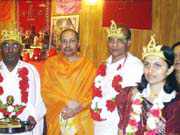Heads turned and eyes widened on a recent postcard-perfect day last week on the corner of Fifth Street and Paterson Plank Road. Traffic came to a standstill at the sight of hundreds of brightly-dressed people of Indian decent congregated on the sidewalk in front of the City Limits Hall.
A white horse and buggy waited outside for what many passersby thought was a wedding. But it was actually a celebration of a local sect of Indian people who adhere to the religion of Jainism.
For many, this might be a completely foreign word or idea, but it might be worth considering or learning about. There are, according to Hudson County Jain spokesperson Divyesh Shah, approximately 300 families who subscribe to the Jain religion in Hudson County. And being that Hudson County is one of the most ethnically and racially diverse counties in the United States, the Hudson County followers of Jainism wish to make their presence felt in the community at large.
For the uninitiated, Jainism is an ancient religion founded in approximately 530 B.C. by an Indian monk named Mahavir. Mahavir was a person of royal decent who eventually gave up his worldly possessions to preach a gospel of peace and non-violence.
According to www.jainsamajofusa.com, the samaj (or congregation) of Hudson County was founded in 1973 on Park Avenue in Hoboken and has grown over the years to boast the aforementioned 300 families in the Hudson County Area.
And as last week’s second anniversary of the Sept. 11, 2001 attacks reverberated throughout the country and especially Hudson County (which lost the most people of any area), it is perhaps fitting that Jainism’s complete disdain for violence be taken to heart by people of all walks of life.
According to www.angelfire.com/co/jainism, the five tenets at the heart of Jainism are: non-violence, truthfulness, non-stealing, chastity and non-attachment (being able to let go of all worldly possessions and relationships). The web site goes on to state that "Jains hold these vows at the center of their lives. The monks and nuns follow these vows strictly and totally, while the common people try to follow the vows as far as their lifestyles will permit."
Another very important tenet of the Jain religion is the eradication of the concept of God as creator, protector, and destroyer. Mahavir also denounced the worship of gods and goddesses as a means of salvation. He taught the idea of supremacy of human life and stressed the importance of a positive attitude towards life.
And last week, those "common people" gathered in a celebration of peace and togetherness. Smiles abounded even as the Union City Police Department arrived on the somewhat chaotic scene to try to control the swelling crowd spilling out onto Fifth Street.
Inside the City Limits Hall, the scene was even more chaotic, yet somehow solemn. People of all ages commiserated, prayed and chanted in the hall that had been converted into a makeshift Jain temple complete with an alter of sorts and offering tables filled with rice and dried fruit.
A P.A. system carried the chants of various members of the congregation. A microphone was passed around an each member chanted with a fervor that only matched by the call and response of the gathered group of worshippers.
According to one of the people gathered outside, "The concept of Jainism is the same as the concept of non-violence that Martin Luther King preached. In fact, Martin Luther King was a student of Mahatma Gandhi and used Gandhi’s teachings as a basis for his philosophy."
According to Divyesh Shah, only about 2 percent of the population of India adheres to the Jain faith. The rest practice Hinduism or various forms of Islam. That puts the United States followers of Jainism at a crossroads. One one hand, they are comparatively isolated, even from their Hindu brethren, but at the same time, they are in a unique position to make significant inroads into getting their message of compassion and non-violence out into a world that needs it.
